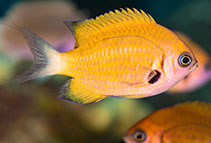| Family: |
Pomacentridae (Damselfishes), subfamily: Chrominae |
| Max. size: |
7.6 cm SL (male/unsexed) |
| Environment: |
reef-associated; marine; depth range 5 - 56 m, non-migratory |
| Distribution: |
Pacific Ocean: Hawaiian Islands, Johnston Atoll, Line Islands, Pitcairn Island, Oeno Atoll, Gambier Islands, Tuamotu Archipelago, Society Islands, Austral Islands, Rapa, Cook Islands, Phoenix Islands, Fiji, Tonga, New Caledonia, Loyalty Islands, Chesterfield Islands, Vanuatu, Coral Sea islands and reefs, Marshall Islands, Chuuk, Pohnpei, Yap, Wake Island, Mariana Islands, and at the Ogasawara Islands and Bonin Islands of Japan. |
| Diagnosis: |
Dorsal spines (total): 12-12; Dorsal soft rays (total): 12-14; Anal spines: 2-2; Anal soft rays: 12-14; Vertebrae: 26-26. This species is distinguished by the following set of characters: D XII,12-14 (usually XII,13); A II,12-14 (usually II,13); pectoral-fin rays 16-18 (usually 17); spiniform caudal-fin rays 2; tubed lateral-line scales 14-17 (usually 15-16); total gill rakers on first branchial arch 27-32; body depth 1.8-2.0 (mean 1.9) in SL. Colouration: in life overall yellowish brown, typically with lateral greyish to purplish stripes along scale rows; the dorsal and anal fins are brownish with dark-brown triangular marking posteriorly and caudal fin yellowish; pectoral fin with a prominent round, blackish spot covering the entire base and axil (Ref. 122787). |
| Biology: |
Benthopelagic (Ref. 58302). Feeds on planktons (Ref. 89972). Diurnal species (Ref. 54980; 113699). Oviparous, distinct pairing during breeding (Ref. 205). Eggs are demersal and adhere to the substrate (Ref. 205). Males guard and aerate the eggs (Ref. 205). |
| IUCN Red List Status: |
Not Evaluated (N.E.) Ref. (130435)
|
| Threat to humans: |
harmless |
Source and more info: www.fishbase.org. For personal, classroom, and other internal use only. Not for publication.
